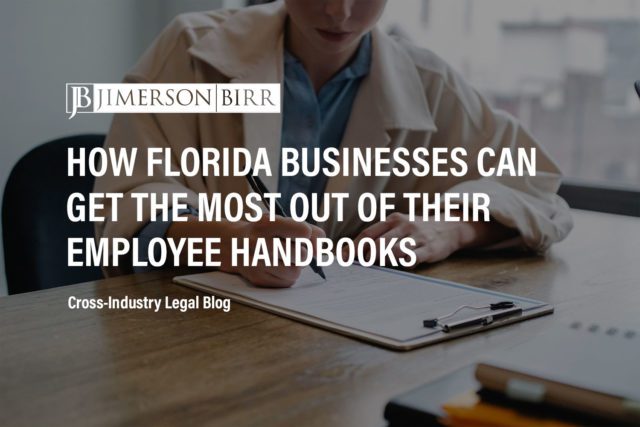What do employee, consumer, and financial data privacy policies encompass?
Employee, consumer, and financial data privacy policies are crafted to adhere to the prevailing Florida and federal laws. The Florida Information Protection Act of 2014 (FIPA) shapes much of Florida’s related legal landscape. This legislation mandates businesses to institute reasonable security measures, promptly notify affected parties during a data breach, and report such incidents to state authorities. Failure to comply with FIPA’s requirements can lead to penalties and potential litigation.
Need help with training, compliance, or litigation to protect your workplace? Schedule your consultation today with a top employment law attorney.
Which laws, rules, and regulations apply to data privacy policies?
In Florida, several laws and regulations govern data privacy policies across employee, consumer, and financial domains:
- Florida Information Protection Act of 2014 (FIPA): Mandates security measures, breach notifications, and incident reporting.
- Health Insurance Portability and Accountability Act (HIPAA): Federal law regulating health information privacy for covered entities and their associates.
- Fair Credit Reporting Act (FCRA): Federal law governing the collection and use of consumer credit information.
- Florida’s Social Media Privacy Law: Prohibits employers from accessing employees’ personal social media accounts.
Florida employers must comply with these regulations to protect data and mitigate legal risks.
What are common issues associated with employee, consumer, and financial data privacy policies that lead to litigation against employers?
Florida employers navigating data privacy policies face various legal risks, potentially leading to litigation. Common issues include:
- Inadequate data protection: Failure to implement robust security measures may result in legal action under FIPA.
- Data breach notification: Non-compliance with FIPA‘s notification requirements can lead to lawsuits.
- Improper use of credit reporting: Violations of FCRA by misusing credit reports may result in legal consequences.
- Violations of social media privacy: Infringements of Florida’s Social Media Privacy Law can lead to litigation.
What are the perquisites to file a lawsuit regarding data privacy policies, and what legal defenses may employers assert?
Employees filing data privacy lawsuits must typically:
- Exhaust administrative remedies: Some cases require filing complaints with regulatory agencies before litigation.
- File within statute of limitations: Lawsuits must be filed within applicable time frames.
- Demonstrate harm: Employees must show actual harm from the alleged privacy violation.
Employers defending against lawsuits may use legal defenses such as:
- Compliance with laws: Asserting adherence to applicable laws and regulations.
- Consent: Arguing informed consent for actions like accessing credit reports.
- Statute of limitations: Contesting that the lawsuit exceeds the applicable time limit.
Understanding these legal dynamics empowers employers to protect data and reduce the risk of litigation.
To determine whether your unique situation may necessitate litigation or another form of specialized advocacy, please contact our office to set up your initial consultation.
What measures must employers take to comply with data privacy policy requirements?
Florida employers must take specific measures to comply with data privacy laws:
- Implement robust data security: Establish and maintain security measures as FIPA requires.
- Notify affected parties: Adhere to FIPA guidelines for timely breach notifications.
- Obtain proper consent: Secure informed consent before accessing sensitive information, per FCRA.
- Respect social media privacy: Abide by Florida’s Social Media Privacy Law, refraining from accessing personal social media accounts.
Please contact our office to set up your initial consultation to see what forms of legal advocacy or intervention may be available for your unique situation.
Frequently Asked Questions
Can employers monitor employees’ use of company-provided devices and communication tools?
Employers generally have the right to monitor employees’ use of company-provided devices and communication tools. However, employers must inform employees about the monitoring and avoid infringing on their reasonable expectations of privacy.
Are there any specific industries with heightened data privacy requirements in Florida?
Specific industries like healthcare and financial services have heightened data privacy requirements. For example, healthcare providers must comply with the Health Insurance Portability and Accountability Act (HIPAA), while financial institutions must adhere to the Gramm-Leach-Bliley Act (GLBA).
Can employees sue their employer for unauthorized access to their personal social media accounts?
Employees can sue employers for unauthorized access to their social media accounts under Florida’s Social Media Privacy Law. This law prohibits employers from requesting or requiring access to employees’ personal social media accounts, and employees may be entitled to damages for violations.
Have more questions about employment law training, compliance, or litigation?
Crucially, this overview of employee, consumer, and financial data privacy policies does not begin to cover all the laws implicated by this issue or the factors that may compel the application of such laws. Every case is unique, and the laws can produce different outcomes depending on the individual circumstances.
Jimerson Birr attorneys guide our clients to help make informed decisions while ensuring their rights are respected and protected. Our lawyers are highly trained and experienced in the nuances of the law, so they can accurately interpret statutes and case law and holistically prepare individuals or companies for their legal endeavors. Through this intense personal investment and advocacy, our lawyers will help resolve the issue’s complicated legal problems efficiently and effectively.
Having a Jimerson Birr attorney on your side means securing a team of seasoned, multi-dimensional, cross-functional legal professionals. Whether it is a transaction, an operational issue, a regulatory challenge, or a contested legal predicament that may require court intervention, we remain tireless advocates at every step. Being a value-added law firm means putting the client at the forefront of everything we do. We use our experience to help our clients navigate even the most complex problems and come out the other side triumphant.
If you want to understand your case, the merits of your claim or defense, potential monetary awards, or the amount of exposure you face, you should speak with a qualified Jimerson Birr lawyer. Our experienced team of attorneys is here to help. Call Jimerson Birr at (904) 389-0050 or use the contact form to schedule a consultation.
Here are some blogs written by JB attorneys that provide more information about employment law:
- Independent Contractor or Employee: Know the Difference (jimersonfirm.com)
- Rescinding Job Offers in At-Will Employments in Florida | Jimerson Birr (jimersonfirm.com)
- Tips for Drafting Employee Handbooks in Florida | Jimerson Birr (jimersonfirm.com)
- Understanding The EEOC Process: Employee Sexual Harassment And Sexual Discrimination Claims In The Era Of #MeToo (jimersonfirm.com)
- Contesting OSHA Violations and OSHA Citations: A Guide To OSHA Employer Rights (jimersonfirm.com)
- What Do Contractors Need to Know About Employee Duty of Loyalty and Ability to Compete | Jimerson Birr (jimersonfirm.com)


We live by our 7 Superior Service Commitments
- Conferring Client-Defined Value
- Efficient and Cost-Effective
- Accessibility
- Delivering an Experience While Delivering Results
- Meaningful and Enduring Partnership
- Exceptional Communication Based Upon Listening
- Accountability to Goals











